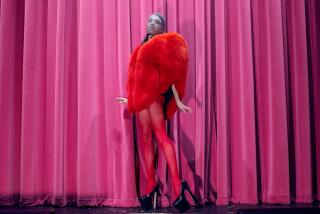Imelda Marcos’ Shopping Gave ‘Spree’ New Meaning
NEW YORK — Shortly after the Sotheby Parke Bernet auction house here was retained to sell a $5-million collection of rare 17th- and 18th-Century English paintings, furniture and pottery from the apartment of philanthropist Leslie R. Samuel, the dealers suddenly canceled the auction.
“Imelda Marcos purchased the entire contents of the apartment before the auction,” said a former Sotheby’s employee familiar with the September, 1981, transaction. “The sale was canceled because she had purchased the entire contents of the catalogue.”
If the price tag seemed high, the former First Lady of the Philippines apparently did not flinch. She previously had offered $9 million to buy the Samuels’ upper Park Avenue triplex cooperative apartment, but was turned down by the building’s nervous co-op board members after anti-Marcos activists threatened to picket the building.
Indeed, in a city known for expensive shops and world class-shoppers, Imelda Marcos’ tastes and checkbook knew few bounds, judging from canceled checks, bank records and other documents submitted Thursday in U.S. District Court here by Philippine government officials.
$3 Million in a Day
During one trip to New York in May, 1983, Imelda Marcos spent more than $2 million at exclusive New York jewelers and another $1.3 million on other merchandise, according to handwritten notes in a stenographer’s note pad of check disbursements. The notes were made by Fe Roa Gimenez, a secretary in the Philippine Consulate here, and copies were given to The Times by lawyers for the Philippine government.
The list of Imelda Marcos’ purchases included $23,000 for books, $43,370 for silver flatware, $10,000 for an antique dessert service, $34,880 for limousines, $20,046 for unspecified “shopping” and $10,340 for bed sheets.
That amount for sheets “would not be all that uncommon,” said Frederico Baldoni, vice president of Pratesi Linens Inc., a purveyor of fine Italian linens where Imelda Marcos did her shopping. “Pillow cases start at $100. . . . If you’re talking about a set of bed linens, you’re talking about $500 for a set, and go on up to $3,000.”
On Feb. 15, 1984, Vilma Bautista, a first secretary at the Philippine mission to the United Nations who sometimes paid bills for Imelda Marcos, received a bill marked “Marcos” for $40,650 for flowers delivered in the previous month. Gimenez a month later signed a check for $6,942 to F A O Schwarz, the tony Fifth Avenue toy store.
At the elegant Scribner’s book store on Fifth Avenue, Imelda Marcos and her retainers once arrived and began picking dozens of books from virtually every section of the store, quickly running up a tab of several thousand dollars for books on art, history, architecture, science fiction and other topics.
‘It Was Wild’
“There were baskets full,” said the store’s chief of customer service, who asked not to be identified. “She couldn’t physically walk out with all of them, even with all the guards. . . . It was wild. Those kind of business days don’t come along very often.”
“They were like locusts,” said Francisco Rodrigo, an anti-Marcos activist who shadowed the Marcoses during their visits and who now runs the Philippine Consulate in New York. “I was told that for her buying sprees, she would call and ask stores to close to allow her and her entourage to browse.”
Imelda Marcos also spent lavishly to redecorate a former Philippine Consulate on East 66th Street and a 14-acre beachfront estate called Lindenmere in Center Moriches, Long Island, in 1981. Canceled checks signed by Vilma Bautista show she paid $164,000 for chandeliers, $30,000 for carpets, $19,500 for curtains and $100,000 to Steinway & Sons for pianos. Two payments for “Filipino workers’ subsistence” at the sites totaled $8,000.
The court records, mostly obtained in Manila after the Marcoses fled on Feb. 25, were presented to the court here by Jovito R. Salonga, head of a Philippine commission investigating Marcos’ “ill-gotten wealth.” Salonga offered the records to document the government’s effort to seize five New York buildings purportedly owned by the Marcoses and worth more than $300 million.
Visited Ritziest Jewelers
Imelda Marcos apparently had a passion for expensive jewelry, according to the secretary’s checkbook and handwritten notes. In 1983 alone, she visited some of New York’s best-known and ritziest jewelers.
According to the list of check disbursements, Giminez paid $100,000 as partial payment to Van Cleef & Arpels for “workmanship on emerald and diamond and ruby necklaces” on May 30, 1983. The next day, she paid $200,000 to Fred Leighton Ltd. as partial payment for “antique jewelry.” La Vieille Russie got $8,500 for gold cuff links.
A month later, on June 30, Giminez paid Cartier Inc. $200,000 for a diamond bracelet, and then another $208,000 for an emerald and diamond bracelet. Harry Winston’s was paid $52,000 for “heart-shaped earrings,” and Bulgari jewelers got $29,312.
Spokesmen for the jewelry shops declined to comment Friday on Imelda Marcos’ tastes or spending, saying they would not discuss any customers. “I, like everyone else, am dying to read about it,” said Sheila Reisel, an attorney for Van Cleef & Arpels. “But we can’t talk about it.”
If Imelda Marcos’ own tastes were expensive, Filipinos here said in interviews, she apparently was no piker toward others. She handed out $100 tips at the Waldorf Towers, where she rented an entire floor for her visits, and distributed custom-designed gold watches as Christmas presents to her friends.
“Each watch had the Marcoses’ names and images on them,” said Romeo Capulong, a Filipino attorney here who heads the Filipino Lawyers’ Committee for Human Rights. “They were giveaways.”
A 1982 Marcos document accurately reflects money funneled by a California firm. Page 18.
More to Read
Inside the business of entertainment
The Wide Shot brings you news, analysis and insights on everything from streaming wars to production — and what it all means for the future.
You may occasionally receive promotional content from the Los Angeles Times.











